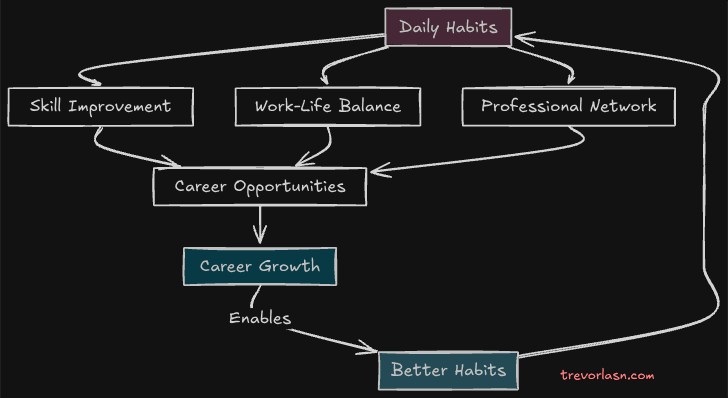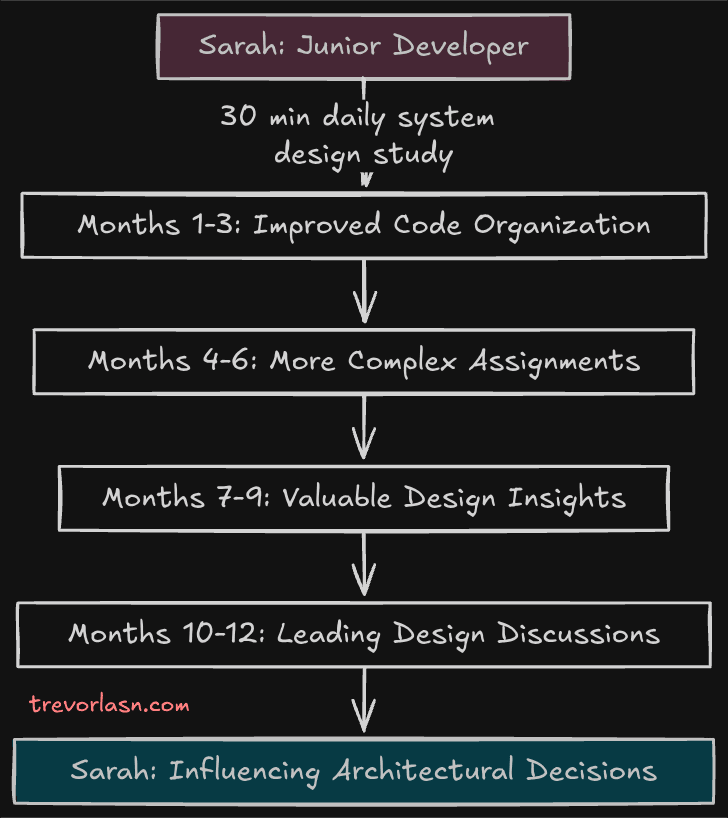As developers, we’re used to thinking in terms of code - functions, loops, and iterative improvements. But have you ever considered applying these same principles to your personal and professional growth? Just as a single line of code can compound into a complex application, small daily habits can transform your career trajectory over time.
Frame your career progression as an iterative development cycle. Each day, you’re making choices that shape your professional future:

The Compound Effect in Career Development
As developers, we understand the power of iterative improvements in our code. The same principle applies to our careers. Let’s break it down:
-
Daily Actions Matter: Choices that impact your professional growth
- Solving a challenging coding problem
- Learning a new technology or technique
- Collaborating effectively with team members
- Improving your code quality or documentation
-
Skills Grow Incrementally: Your skills develop over time, like building a complex application
- Consistent practice reinforces and expands your abilities
- Each project or task, no matter how small, adds to your experience
- Over time, these incremental improvements compound
-
Opportunities Follow Growth: As your skills improve, new doors open
- You become more valuable to your team and organization
- New challenges and responsibilities naturally come your way
- Your professional network expands, opening up more opportunities
-
Career Trajectory Shifts: The cumulative effect leads to significant advancement
- The combined impact of daily actions, skill growth, and new opportunities results in career progression over time
Note: This process isn’t always linear or fast, but it is consistent. Think of it like optimizing code:
- Sometimes you make big improvements quickly
- Other times, progress feels slow as you refine and debug
- Occasionally, you might need to refactor your approach entirely
The key is to focus on consistent, purposeful actions aligned with your long-term career goals. But what does this look like in practice? Let’s look at a real-world example that illustrates the power of small, daily habits.
Sarah’s Story: From Junior Dev to Design Lead
Sarah was a junior developer, fresh out of a coding bootcamp and eager to grow her skills. Like many of us, she felt overwhelmed by the vast amount of knowledge in the tech world. Instead of trying to learn everything at once, she decided to take a more measured approach.
Sarah’s small habit: 30 minutes of daily learning about system design.
At first, this seemed like a tiny commitment - almost too small to matter. But let’s see how this habit played out over time:
-
Month 1-3: Sarah started noticing patterns in the systems she worked with daily. Her code became more organized and easier to maintain.
-
Month 4-6: Her improved understanding of architecture caught her team lead’s attention. Sarah started getting more complex assignments.
-
Month 7-9: The challenging work pushed Sarah to dig deeper into system design concepts. She began contributing valuable insights during team discussions.
-
Month 10-12: Sarah’s knowledge had compounded to the point where she was now leading design discussions for new features.

Within a year, this simple 30-minute daily habit had transformed Sarah from a junior developer to someone capable of influencing the architectural decisions of her team.
The compound effect of Sarah’s small, consistent actions led to significant career growth. Her story illustrates how the principles we discussed earlier play out in real life:
- Daily actions (learning about system design) led to skill growth.
- Skill growth opened up new opportunities (more complex assignments).
- These opportunities further accelerated her learning and growth.
- Over time, her career trajectory shifted dramatically.
Sarah’s experience shows us that you don’t need to make drastic changes to see significant results. Small, consistent efforts, when applied strategically, can lead to remarkable transformations in your career.